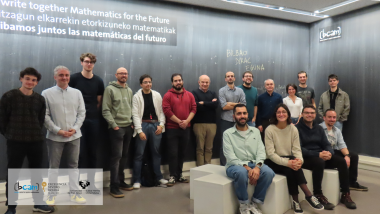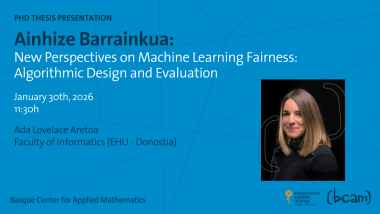MPDEE’25 - Conference on Models in Population Dynamics, Ecology, and Evolution arrived to BCAM
The Basque Center for Applied Mathematics (BCAM) successfully hosted the international conference Models in Population Dynamics, Ecology, and Evolution (MPDEE’25) from 5 to 9 May 2025. The event brought together leading scientists from across the globe to explore cutting-edge developments in mathematical modelling of biological systems, offering a vibrant platform for dialogue between theoretical innovation and empirical research.
Organised by BCAM’s Mathematical and Theoretical Biology (MTB) group and the University of Leicester (UK), MPDEE’25 reaffirmed its reputation as a key gathering for researchers working at the intersection of mathematics, ecology, evolution, and public health. With 80 attendees, the conference featured a rich scientific programme addressing challenges ranging from population dynamics under environmental change to disease modelling and evolutionary theory.
Throughout the five-day event, keynote speakers presented on a wide spectrum of topics reflecting the conference's commitment to interdisciplinarity. Highlights included Maíra Aguiar’s insights into epidemic modelling, Christina Cobbold’s exploration of eco-evolutionary feedbacks, and Sigrunn Eliassen’s work on behavioural ecology. William F. Fagan offered compelling perspectives on spatial population dynamics, while Ulrike Feudel examined complex systems and regime shifts.
The conference also featured an honorary lecture by Sergei Petrovskii of the University of Leicester, who was recognised for his long-standing contributions to ecological modelling and the mathematics of biodiversity.
In addition to keynote talks, MPDEE’25 included numerous contributed sessions, fostering dynamic exchanges among early-career researchers and established scholars. Discussions often centred on the role of mathematical models in understanding climate-driven changes in ecosystems, the interplay between disease evolution and human behaviour, and the application of modelling tools beyond biology into social and environmental sciences.
Held at BCAM’s headquarters in Bilbao, the event offered not only a scientific but also a cultural experience, as participants enjoyed the vibrant Basque capital. The conference concluded with a shared commitment among attendees to deepen collaboration and advance the role of mathematics in addressing urgent biological and environmental challenges.
This conference is partially funded by the Basque Government through the project BERC 2022-2025 and the European Society for the Mathematical Theoretical Biology.

Related news




